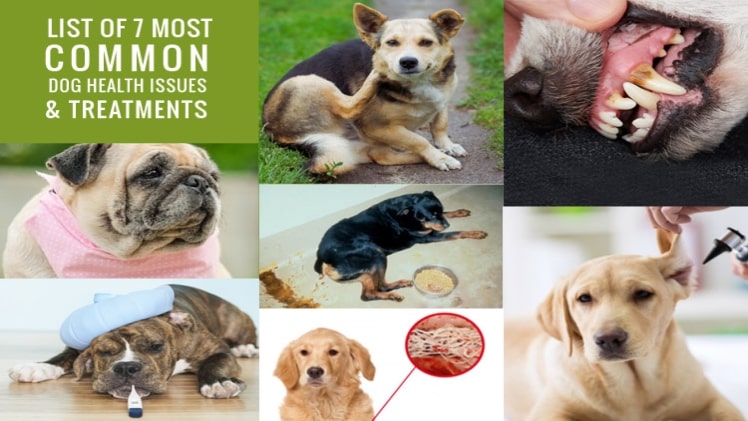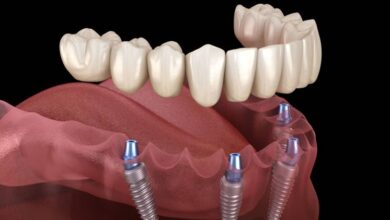Common health problems in dogs

No matter how hard we try, dogs get sick just like every other living creature. We care deeply about and wish the best for our dogs.
Dogs occasionally encounter health issues, even with the best possible care, so we aim to do everything we can to ensure that they live a healthy life.
To properly care for our pets, we must comprehend and get aware of their typical health issues. You could delay the start of such problems and, in some circumstances, completely prevent them with the right primary care and a lot of attention.
Here are a few things to be on the lookout for and some solutions.
Periodontitis, also known as gum disease
The degenerative condition periodontitis causes the tooth to lose its attachment to the socket, which results in a weakened tooth, tooth loss, and dangerous infections. When your dog bites, there’s a possibility that bacteria will get into his bloodstream and lead to illnesses in his kidneys, heart, lungs, and kidneys.
To help prevent dental and gum problems, regularly brush your dog’s teeth with meat-flavoured toothpaste and a toothbrush.
Click here for more information Pet ESA letter online
Ear Infection
This rather typical medical condition develops when the dog’s ear lining becomes swollen and inflamed in one or even both ears, first from the ear membrane to the inner ear and the eardrum. If left untreated, this sickness can be extremely painful and debilitating, and it may need surgery to be cured.
To maintain your dog’s ears, follow a strict grooming regimen.
Obesity
The health and lifespan of a dog are harmed by excess fat. Obese dogs are more prone to diabetes, heart disease, hypertension, and many malignancies. Additionally, obesity considerably increases the risk of developing osteoarthritis and hip dysplasia.
To assist your dog (and you, if you want!) take off those extra pounds, feed them an elevated, low-fat diet in slow-feeder dog bowl and get lots of exercise.
Dehydration and Heat-Related Illnesses
As we move into summer, and the temperatures climb, make sure your dog is adequate hydration at all times, especially if you are active outdoors or in a particularly hot climate. Dehydration can lead to heat exhaustion, which in turn can lead to heatstroke, a potentially fatal condition.
Symptoms of dehydration are:
- Red eyes
- Excessive drooling and panting
- Lethargy and weakness
- Dark-colour pee
- Dizziness and nausea
- Excessive thirst
- Headache
- Loss of appetite
Do not forget that some breeds are more susceptible to heating than others. Siberian Huskies, German Shepherds, and other northern breeds with thick, double coats that are adapted to the cold may struggle in the heat.
Breeds with small snouts and flat faces, like Boston Terrier, Boxers, Pugs, and French Bulldogs, may also experience Cough and respiratory issues, especially in extreme temperatures.
Long Overgrown Nails
The coming of summer! And that signals the beginning of trekking season.
The large claws on your dog might make walking unpleasant and painful. A healthy paw might become an unbalanced foot with long nails, which reduces grip and results in flaws and injuries. In the worst case, claws may extend to the point where they curve and pierce the cushions of the animal’s paws.
When you run several miles over difficult terrain, which naturally files the nails down, trim your dog’s fingernails every 4 to 6 weeks. However, if you plan to take your dog on plenty of treks outside this summer, remember to check on their fingernails regularly and maintain them as clean as you can!
Hip Dysplasia
Hip dysplasia is indeed a severe condition that develops whenever one or even both hips and knees in a puppy grow incorrectly.
Hip dysplasia symptoms include pain, sadness, inflammation, and eventually arthritis. Most dogs inherit hip dysplasia from one of their parents, and symptoms typically manifest while the dog is still growing.
Glucosamine for pets can help reduce joint pain, stiffness, and irritation while promoting your dog’s healing process and increasing cartilage development. Glucosamine can be administered in conjunction with analgesics or anti-inflammatory medications that your veterinarian has prescribed if the joint pain is more severe.
Skin Disease
Numerous canines suffer from different skin issues. Skin disorders in dogs frequently manifest as scratching and clawing.
They might also experience localized hair loss. Numerous factors, such as allergies, bacteria, skin conditions, and more, can cause skin problems in dogs. If your dog is continually chewing, scratching, or exhibiting any unusual marks, take them to the vet straight immediately. click shop for teacup puppies on sale to know more common health problems.
Diarrhea and Vomiting
Vomiting may accompany diarrhea or it may happen on its own. The same things that cause vomiting may also cause diarrhea. The majority of the time, prolonged diarrhea does not require medical attention, but it can dehydrate you. Our dog’s health could be in jeopardy if diarrhea persisted.
There are numerous causes for a dog to vomit. Even while you are not obliged to take your pet to the vet each time he vomits, you should still pay attention if it keeps happening.
Vomiting may be a sign of poisoning, a digestive obstruction, or other severe disorders. This issue may also be caused by malnutrition. You should see a vet if your dog keeps vomiting or displays additional symptoms including diarrhea, lack of appetite, or weakness.
Final Thoughts
As humans, several dogs are genetically prone to specific illnesses, but if we can learn to recognize and treat problems, we can assist our beloved companions to enjoy long and fulfilling lives. Good fortune!





